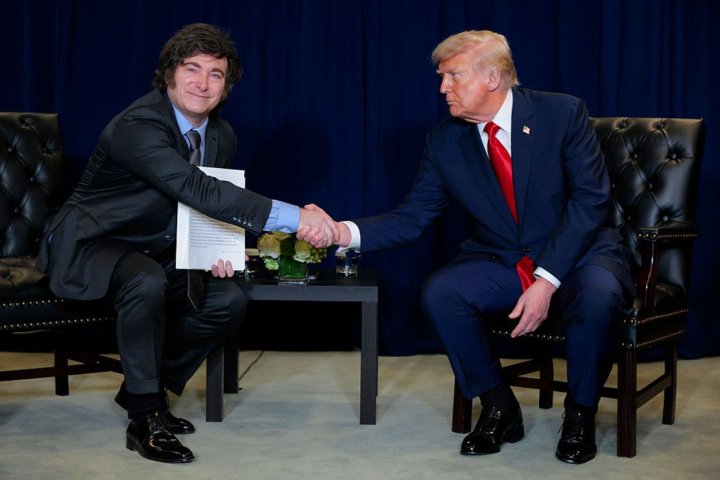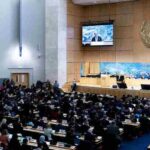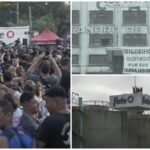
The “shield” is a financial operation of enormous magnitude that seeks to completely close any possibility of “leakage” or bankruptcy of a model. At the end of theIn 2000, the De La Rúa government announced with great fanfare that they had found a solution to the worsening crisis: a agreement for US$ 40,000 million with the IMFof which the Fund itself would participate with US$ 13,700 million, the World Bank and the IDB with another US$ 2,500 million each, and also private banks (US$ 10,000 million), AFJP, debt swaps and even the government of Spain (with US$ 1,000 million).
“Shielding is education”; “Shield is growth”they proposed from the ruling party, even promoting an advertising campaign. The same president who ended up escaping in helicopter A year later he said: “The shielding is an unprecedented economic, political and financial operation that generates a guarantee fund so large for the country that it clears up any threat or doubt about the future of Argentina.” The threat and the doubt were concrete: at that point it was impossible to guarantee payments of the fraudulent debtwhich had grown non-stop since the departure of the last dictatorship.
Las conditions that the IMF put to accompany the “aid” were ferocious: a profound pension reform, reduction of public spending, fiscal adjustment, restructuring of ANSES and PAMI, and freezing of national and provincial public spending.
The desperation to obtain funds was explained by a refusal of the government and sectors of the business class to devalue the peso. Doing so implied the end of convertibility and the recognition of a failure. Of course, it also implied a brutal adjustment for the working class and the popular sectors, and even more so if the exit from that convertibility was carried out in a chaotic, uncontrolled manner, with a market coup and after the big businessmen had literally emptied the coffers of the Central Bank, as happened in 2001.
But it was not the latter that motivated De La Rúa to look for armor, but rather the attempt to sustain a rotten governmentfar from the social crisis that affected millions of working families in the midst of corruption scandals (which had led to the resignation of the vice president of the Alliance, Chacho Alvarez), and benefit the sectors that benefited from looting of the country.
Far from resolving the crisis, andThe armor only served to prolong the agony and deepen the adjustment on workers and retirees, further aggravating the underlying problems. But the pressure from the creditors did not cease. The shielding did not shield, and the government announced, now, a “megacanje” of bonds for others with longer term and high interest rates (the opposite of a “reduction”). The debt increased by US$ 50,000 million.
It will not be surprising to read that Domingo Cavallo’s Secretary of Economic Policy, at that time, was Federico Sturzeneggerwhich ended prosecuted for the crime of negotiations incompatible with the public service. The Supreme Court acquitted him. And the caste returned unpunished, not just once, but several times to occupy public positions. But the debt was burdened on the working majorities.
This Wednesday, the North American Secretary of the Treasury, Scott Bessantsurprisingly announced a “armor” to the Milei government, for U$S 40,000 million. The United States government will participate with a US$20 billion swap and private entities and banks for other U$S 20,000 million. Hopefully the similarities between this and the other armor are just the amount.
One rudeness, two rudenesses
The Bessent ads appeared after the historic rudeness that Milei suffered last Tuesday the 14th in his meeting with Donald Trump. Not only did he not receive him alone in the Oval Office, but he made it clear that the “financial assistance” will arrive if, and only if, he wins the midterm elections. “If Milei wins, we continue with him, and if he loses, we leave”. Fin.
The volatility of the market with each tweet and each piece of news about the comings and goings (the dragging) of the Argentine government with the North American government, indicates that there is nothing more to know until the 26th. There is no less worse option: if the ruling party achieves a “good” result (a victory or a narrow defeat), the “financial assistance” from the United Statesthe exchange rate scheme could be maintained for a while longer, and the agony of indebtedness and flight (business of friends of Bessent and imperialism through) would be prolonged until the collapse was precipitated. Caputo returned promising labor and tax reform (yet another) to the big business community at the IDEA colloquium.
If the ruling party loses the 26Othere will be no financial assistance and the exchange rate regime would be shown for what it is: unsustainable. The government will blame the voters (Macri dixit in the PASO) and will let a revanchist devaluation. It is difficult to measure or predict how far the consequences and political and social events that this fact may trigger will reach.
How the “opposition” votes are distributed is also not indifferent to what is to come. A good result for the Left Front will mean a great starting point to fight the imposition of another solution to this false dichotomy. A solution that is not reduced to accepting as simple spectators the total surrender of sovereignty and an atrocious debt, or a devaluation that further destroys the living conditions of the working majorities.
Appearances and realities
According to the latest report of the Provincial Bank of Buenos Airesthe overvalued exchange rate was artificially sustained with “exogenous sources”: a total of US$ 7.4 billion between September and so far in October. Of these, US$ 1,110 million came from the Central Bank, US$ 5,700 million were advanced by the cereal companies – of which US$ 2,100 million were bought by the Treasury, and then sold on the market, and US$ 3,600 million were directly offset by private demand – and US$ 440 million more were sold by the Ministry of Economy.
And they propose that “this would be the fourth largest episode of sales since 2003”, one at the end of 2015 with Cristina Fernández and two during the Macri administration (April and May 2018 and August to October 2019). Unfortunately, after those three episodes it always ended in a devaluation of salaries and pensions.
Wanting to “help,” the head of the department also came out to speak. IMF, Krisalina Georgievawho again congratulated Milei’s direction: “we see a genuine change for the better in Argentina in the last two years. We have gone from negative growth to 4.5% this year, which is a slower pace than last year.”
The truth is that the IMF cut growth forecasts for Argentina for this year, from 5.5% to 4.5%and also raised the inflation projection to 28%. Likewise, they are even more optimistic than what the “market” expects. According to the Central Bank’s survey, the country’s main consulting firms and banks project growth of 3.9% and inflation of 29.8% annually at the end of 2025.
Milei assumed “questioningly” that the economy and formal employment They have not grown for more than 12 years. Now it’s been almost 14 years and the situation has not changed, even though his government brutally implemented many of the promised reforms: deregulation, adjustment of public spending by 40%, tax reform, Base Law, etc.
The economy formally entered recessionhaving completed two consecutive quarters of decline in activity. Private projections that follow sectoral production data estimate that the economy fell 0.8% in the third quarter in relation to the second, which had already been negative by -0.1% according to INDEC.
Technical confirmation is not necessary. Below “the street” is very difficult. He formal salaried employment fell in July to its lowest level since Javier Milei was President. I know they lost 205,456 positions registered since November 2023, of which 127,000 are private salaried jobs, almost 57,900 public and 20,600 in private homes.
According to the specialist Luis Campos“in July 2025 the number of employees registered in the private sector was lower than in July 2015. To say a lost decade is an understatement at this point,” as noted in X by the researcher at the Institute of Studies and Training of the CTA – Autonomous.
.
The industry It lost 39,200 positions during the Libertarian administration and has been losing for 5 straight months. Construction lost 60,500 jobs and the Transportation, storage and communication sector lost another 15,100 jobs.
Due to the backward dollar and a drop in consumption due to loss of income, the inflation It maintained a monthly floor of 2.1% in September, although rising again 0.2 points compared to August.
The strength of the strong
It is notable how the big business which boasts of being modernization and the future reiterates old and not empirically proven ideas regarding how to “gain competitiveness.” In it 61st IDEA Colloquiumunder the motto “Play Argentina. Let’s compete, produce and innovate,” they pointed “against the structural obstacles that increase the cost of operating and make international insertion difficult.”
“To what”obstacles“refer? To the labor rights and taxes. If there is no investment that allows improving labor productivity, it is because they are “forced” to function more as financial speculators than as productive capital. They “want” to invest, but the supposedly high salaries and labor costs and high taxes do not let them.
What did Caputo respond? What they wanted to hear. That this government is the main promoter of those reforms they are asking for, and will go even further with the labor and tax (and pension) reform that would eliminate these obstacles. Curious, when the Argentine tax system is regressive and is based more on taxes on labor than on capital. And curious, when in fact there is 50% job insecurity and a loss of real wages of up to 30% since the IMF returned to the country in 2018.
The strength of the strong is in the awareness of those forces. Avoid a collapse like the one from 2001 requires the entry on the scene of enormous power that those who move the country every day, the working class and the poor people, have organized. It requires preserving the sovereignty of our resources and natural commons in the face of looting, avoiding the “flight” of foreign currency through the nationalization of the banking system in the face of the attempts to exit large speculative capital and leaving us empty, taking the reins of the foreign trade and the strategic sectors of the country, and end the vicious circuit of debt and flight, rejecting the IMF and sovereignly ignoring every dollar of that odious debt.
There is a false dichotomy between containing the dollar based on debt e imperialist interference explicit, the devalue strongly the weight at the same time as continuing under the dependence and conditioning of imperialism. You just have to look at the recent history. And do something different, to turn the page.
Source: www.laizquierdadiario.com

